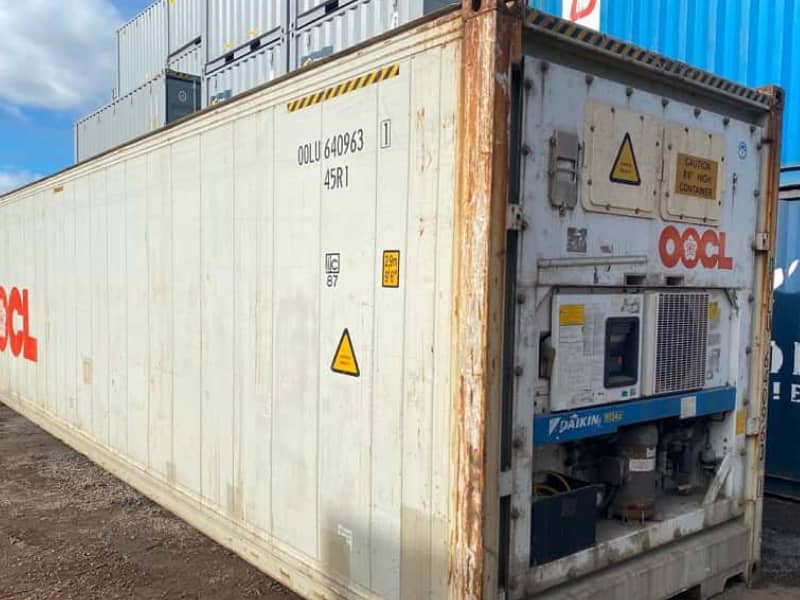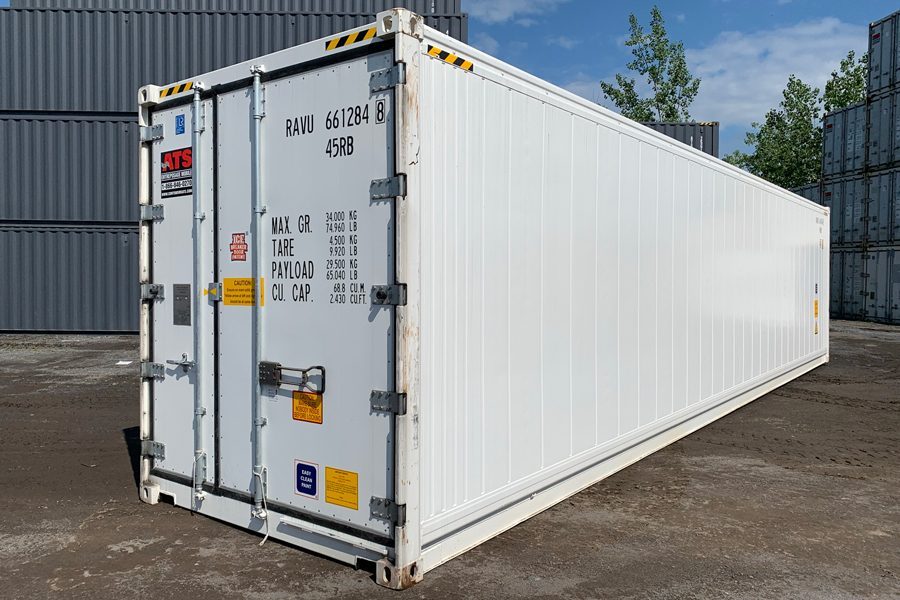Everything About Cold Store Containers: Crucial Insights for Your Storage Space Demands
Cold store containers play an important duty in the preservation of disposable products. They can be found in different forms, consisting of cooled and shielded systems, each designed for particular storage requirements. Comprehending the benefits and key features of these containers is vital for organizations intending to maximize their procedures. As the need for reliable storage services grows, discovering the various alternatives readily available can result in notified decisions that influence both profitability and sustainability. What aspects should one consider when selecting the right container?
Sorts Of Cold Storage Containers
Freezer containers been available in numerous kinds, each designed to meet particular temperature control requirements. Amongst the most usual types are refrigerated containers, which keep temperature levels between 0 ° C to 10 ° C, making them appropriate for perishable goods like fruits, vegetables, and dairy items. An additional type is the deep fridge freezer container, which runs at temperatures listed below -18 ° C, perfect for long-term storage space of icy things such as meats and seafood.
Protected containers give temperature level security without active air conditioning, making them useful for temporary transport of temperature-sensitive products. Additionally, there are portable cold store devices, which supply versatility in locations and are commonly used in occasions or seasonal operations. Lastly, blast refrigerators rapidly reduce the temperature of warm foods, ensuring security and quality. Each type serves a distinct purpose in numerous sectors, from food solution to pharmaceuticals, emphasizing the relevance of choosing the best container for certain storage space demands.

Benefits of Using Cold Storage Solutions

Cool storage space services prolong the rack life of items, reducing waste and increasing profitability for businesses. By effectively handling supply with correct temperature control, companies can optimize their supply chains and enhance operational performance.
In addition, cool storage space facilities permit for flexible storage alternatives, fitting numerous volume needs and seasonal variations popular (used 40ft refrigerated shipping containers). This flexibility helps companies react swiftly to market adjustments
Using cool storage services can assure conformity with health and security regulations, protecting both companies and consumers. In general, the strategic use of cold storage space improves item administration while advertising sustainability and financial stability.
Key Attributes to Seek in Cold Storage Space Containers
When selecting cold store containers, a number of vital functions advantage mindful factor to consider to protect peak performance and dependability. Temperature control abilities are important; containers must preserve constant temperature levels suitable for particular products. Insulation quality likewise plays a significant function, as exceptional insulation reduces energy intake and improves temperature stability.
Next off, ease of accessibility and loading is critical; containers need to use straightforward styles for efficient handling and company. Sturdiness is one more essential element; weather-resistant products ensure longevity and guard components versus ecological elements.
In addition, movement attributes, such as integrated wheels or lifting points, assist in transport, while adjustable layouts enable tailored storage solutions.
Lastly, checking systems, including temperature alarm systems and remote tracking, give real-time updates, making sure that conditions remain ideal. By focusing on these functions, individuals can select freezer containers that fulfill their functional demands efficiently.
Picking the Right Cold Storage Container for Your Needs
Selecting the appropriate freezer container requires a thoughtful analysis of functional needs and details requirements. Aspects such as the kind of items being kept, temperature level sensitivity, and volume needs to be prioritized. Disposable food products might demand containers with rigid temperature controls, while drugs may require precise conditions to keep effectiveness.
In addition, potential users ought to take into consideration the container's dimension and mobility. A larger unit may be needed for bulk storage, while smaller sized, portable choices could be ideal for on-site or momentary requirements. Insulation top quality and power performance are use this link likewise vital, as these will affect functional expenses and temperature level stability.
Compliance with market laws and standards is essential, especially in sectors like food and health care. By meticulously examining these facets, users can select a freezer container that effectively satisfies their distinct needs and assurances optimum storage problems.
Finest Practices for Maintaining Cold Storage Space Issues
Maintaining perfect freezer conditions is crucial for preserving the high quality and security of temperature-sensitive items. Consistently monitoring temperature level and moisture levels is essential; utilizing reliable electronic thermostats and hygrometers can give accurate readings. Moreover, appropriate insulation of chilly storage containers helps minimize temperature level fluctuations and energy loss.
Implementing a first-in, first-out (FIFO) system ensures that older stock is made use of prior to newer supply, reducing waste (used 40ft refrigerated shipping containers). Furthermore, preserving an organized design within the storage space enables for far better air flow and decreases the danger of cross-contamination
Routine maintenance checks on tools, such as seals and compressors, are vital to avoid malfunctions. Staff training on finest practices for packing and dumping items assists preserve temperature level honesty. Maintaining doors closed as much as feasible limits heat exchange, ensuring that the cold storage environment stays effective and steady in maintaining beneficial products.
Expense Factors To Consider for Cold Store Solutions
When assessing cold store remedies, it is vital to consider the initial financial investment costs together with continuous operational costs. An extensive breakdown of these expenses can expose substantial long-term savings capacity for organizations. Understanding these financial aspects aids stakeholders make educated decisions regarding their cold store needs.

Initial Investment Expenses
The financial landscape of cold store containers offers numerous preliminary financial investment prices that companies have to think about. These costs generally include the purchase or rental rate of the containers, which can vary based upon type, dimension, and insulation top quality. In addition, costs connected to retrofitting existing frameworks to fit freezer needs to be factored in, especially if specialized devices is needed. Installation expenses, consisting of electric job and refrigeration systems, likewise add to the general preliminary investment. Organizations should not forget transportation prices for my review here delivering containers to their desired area. Ultimately, possible modification alternatives, such as shelving or temperature level tracking systems, can additionally impact the first monetary expense. Careful budgeting for these elements is important for effective cold store application.
Functional Costs Failure
Operational costs for cold store options incorporate several important price factors to consider that services must browse. Trick aspects consist of energy prices, which can be substantial due to the need to preserve low temperature levels. Upkeep expenses are likewise significant, as normal maintenance is essential to ensure tools operates effectively and stays compliant with wellness and security requirements. In addition, labor prices might develop from the requirement for specialized team to handle and keep track of the storage space environment. Insurance coverage expenses are an additional consideration, as business need to protect their investments versus possible losses. Any type of potential regulatory conformity expenses need to be factored in, as services might need to invest in systems that stick to food safety and security and ecological laws. Understanding these expenses is critical for efficient budgeting.
Long-Term Financial Savings Potential
Buying freezer services offers substantial long-lasting cost savings capacity, transforming first expenditures into financial effectiveness gradually. By reducing putridity and waste, companies can boost their earnings margins considerably. Advanced insulation and energy-efficient systems reduce utility expenses, which accumulate over the life expectancy of the devices. Cold storage containers usually call for much less regular upkeep compared to typical refrigeration techniques, leading to lower repair expenditures. The ability to store items for prolonged periods without jeopardizing quality permits companies to utilize on market fluctuations, enhancing revenue. In addition, the scalability of cold storage remedies enables business to adapt to transforming demands without sustaining extreme costs. Generally, these variables add to a compelling instance for freezer as a cost-effective financial investment method.
Regularly Asked Questions
The Length Of Time Can Food Be Kept in Cold Store Containers?
The duration food can be kept in freezer containers varies by kind. Generally, subject to spoiling items last from days to weeks, while icy foods can stay safe for months, relying on appropriate temperature and storage space problems.
Are Cold Storage Containers Energy-Efficient?
The power performance of cold storage space containers differs based on style and insulation high quality. Modern devices often utilize innovative innovation to decrease power consumption, inevitably adding to lowered operational expenses and ecological impact in lasting usage.
Can Cold Storage Containers Be Customized for Specific Needs?
Freezer containers can certainly be personalized to satisfy details needs. Adjustments might include temperature level controls, size modifications, and extra features, enabling customers to customize options successfully for different storage space requirements and operational choices.
What Are the Common Sizes of Freezer Containers?
Freezer containers usually can be found in standard dimensions such as 10, 20, and 40 feet. These dimensions accommodate different storage demands, making certain versatility for businesses needing temperature-controlled environments for sensitive materials or disposable goods.
Do Cold Store Containers Require Special Licenses for Usage?
Cold store containers commonly moved here call for special permits for use, depending upon neighborhood policies and planned applications. Authorities might mandate authorizations to assure safety criteria, ecological compliance, and proper functional methods are maintained throughout their application.
Cold storage containers come in different kinds, each created to fulfill specific temperature level control requirements. In addition, cool storage facilities enable for adaptable storage options, fitting various quantity demands and seasonal changes in demand. Choosing the right chilly storage container calls for a thoughtful analysis of functional demands and certain needs. The monetary landscape of chilly storage containers provides various first financial investment prices that organizations have to consider. Cold storage space containers can certainly be customized to meet specific needs.